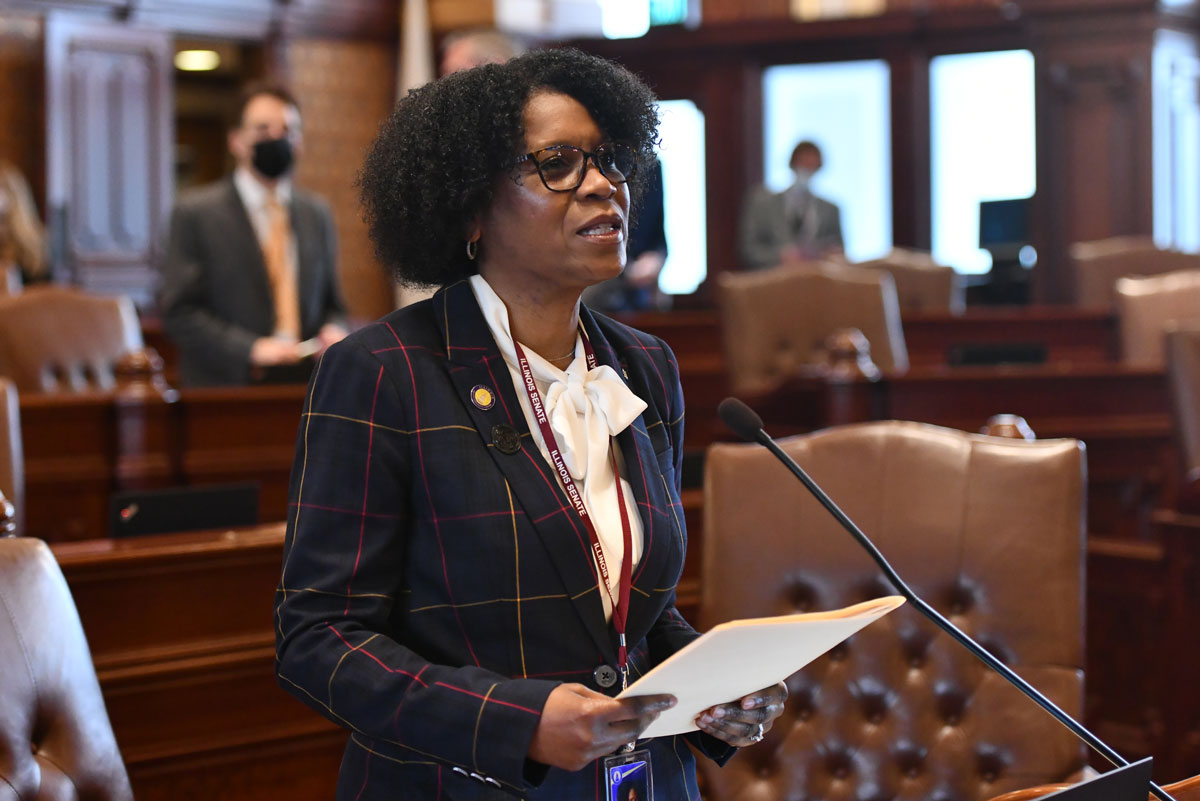- Details
- Category: Senator Adriane Johnson News
 BUFFALO GROVE – To make it even more convenient for residents to ask questions and get assistance with state services, State Senator Adriane Johnson (D-Buffalo Grove) is hosting mobile office hours throughout the summer in locations across the 30th District.
BUFFALO GROVE – To make it even more convenient for residents to ask questions and get assistance with state services, State Senator Adriane Johnson (D-Buffalo Grove) is hosting mobile office hours throughout the summer in locations across the 30th District.
“One of the most important parts of public service is being accessible,” Johnson said. “Not every resident has the time or transportation to visit my office—so I’m bringing my office to them.”
The first mobile office hours event will be held Tuesday, July 13 from 10 a.m. to 1 p.m. in the Buffalo Grove Park District’s Alcott Center, located at 530 Bernard Drive.
For those who are unable to make the July 13 session, Johnson will also host evening office hours on Monday, July 26 from 4 to 7 p.m. at the Vernon Hills Park District’s Sullivan Center, located at 635 N. Aspen Drive.
Johnson invites residents to stop by either event for help with unemployment cases and state services, or simply to discuss issues facing the community.
“Parents and residents who work long hours often find it difficult to schedule a visit during the workday,” Johnson said. “I want to offer everyone the opportunity to talk with me.”
Future mobile office hours events will be announced on Johnson’s Facebook and Twitter pages, as well as on her website, www.SenatorAdrianeJohnson.com.
Residents can also contact Johnson’s office for assistance at 847-672-6201 or www.SenatorAdrianeJohnson.com/contact-us.
- Details
- Category: Senator Adriane Johnson News
 BUFFALO GROVE – The Illinois Rental Payment Program is now open to tenants applying directly for rental assistance, and State Senator Adriane Johnson (D-Buffalo Grove) hopes to help Illinois residents take advantage of the opportunity by hosting an informational webinar in partnership with the Illinois Housing Development Authority.
BUFFALO GROVE – The Illinois Rental Payment Program is now open to tenants applying directly for rental assistance, and State Senator Adriane Johnson (D-Buffalo Grove) hopes to help Illinois residents take advantage of the opportunity by hosting an informational webinar in partnership with the Illinois Housing Development Authority.
“We are winning the fight against COVID-19, but many individuals are still struggling to recover from job and income losses,” Johnson said. “The Illinois Rental Payment Program could help a family keep a roof over their heads, and it’s critical that we get the word out.”
The webinar will be held June 29 at 6 p.m., streamed live on Johnson’s Facebook page at Facebook.com/SenALJohnson. The event is open to all and does not require preregistration.
Read more: As rent assistance program opens to tenants, Johnson hosts informational webinar
- Details
- Category: Senator Adriane Johnson News

SPRINGFIELD – School districts can move forward from the pandemic without worrying about funding cuts due to temporary low enrollment under a new law sponsored by State Senator Adriane Johnson (D-Buffalo Grove).
“Our schools did an exceptional job helping our students learn through the COVID-19 pandemic,” Johnson said. “Now, as they prepare for a full return to the classroom, it’s critical they have all the resources they need to recover.”
Currently, the school funding formula uses average student enrollment over the previous three school years to determine the amount of money districts receive. To lessen the impact of the COVID-19 pandemic on schools’ budgets, Johnson’s law allows school districts to calculate their average student enrollment based on pre-COVID levels.
Read more: Schools can move forward from financial impact of COVID-19 under new Johnson law
- Details
- Category: Senator Adriane Johnson News

BUFFALO GROVE – State Senator Adriane Johnson (D-Buffalo Grove) released the following statement in response to the sentencing of former Minneapolis police officer Derek Chauvin for the murder of George Floyd.
"As we work toward restoring the soul of our nation, we must reconcile the two justice systems in this country: The system that exists for white Americans, and the system that exists for people of color.
"Derek Chauvin's sentencing represents a critical moment in the centuries-long quest toward equality – it shows that everyone, no matter who they are, must be held accountable for their actions.
"May George Floyd's family, friends and community find peace and healing in today's decision."
- Details
- Category: Senator Adriane Johnson News
 BUFFALO GROVE – To encourage residents to get vaccinated against COVID-19 while they shop, State Senator Adriane Johnson (D-Buffalo Grove) is sponsoring a free vaccination clinic during the 12th Annual Vernon Township Community Garage Sale this Saturday.
BUFFALO GROVE – To encourage residents to get vaccinated against COVID-19 while they shop, State Senator Adriane Johnson (D-Buffalo Grove) is sponsoring a free vaccination clinic during the 12th Annual Vernon Township Community Garage Sale this Saturday.
The clinic is cosponsored by the Lake County Health Department, Doctors Test Centers and Vernon Township.
“The Community Garage Sale regularly brings out hundreds of residents to support the Vernon Township Food Pantry,” Johnson said. “This free clinic will give attendees another quick and easy way to help out their community: getting vaccinated.”
The clinic will be held Saturday, June 26, from noon to 3 p.m. at the Vernon Township Community Services Building, located at 2900 N. Main St. in Buffalo Grove. Residents age 12 and up can get vaccinated at the event, but young adults age 12-17 will need a parent or guardian present. Everyone who gets vaccinated will also receive a free one-day pass to Six Flags Great America.
All vaccinations are free, regardless of insurance or citizenship status.
The Vernon Township Community Garage Sale, which is open June 26 from 10 a.m. to 3 p.m., takes place at the Prairie View Metra Station, just blocks from the clinic. The event benefits the Vernon Township Food Pantry.
Those interested in receiving a vaccine at the June 26 clinic can register online at allvax.lakecohealth.org, but walk-ins are also welcome.
For more information, contact Johnson’s office at 847-672-6201.
- Details
- Category: Senator Adriane Johnson News
 BUFFALO GROVE – To give people the opportunity to ask questions, interact with their neighbors and get updates about what’s going on in Springfield, State Senator Adriane Johnson (D-Buffalo Grove) is inviting residents to attend the first in-person session of her monthly outreach event series, Coffee & Connect.
BUFFALO GROVE – To give people the opportunity to ask questions, interact with their neighbors and get updates about what’s going on in Springfield, State Senator Adriane Johnson (D-Buffalo Grove) is inviting residents to attend the first in-person session of her monthly outreach event series, Coffee & Connect.
“Due to the pandemic, many community events have gone virtual, and it’s been more difficult to get to know our neighbors,” Johnson said. “With more and more people getting vaccinated every day, I’m excited to be able to meet and chat with residents in person about their vision for our community’s future.”
The next Coffee & Connect session will be held Saturday, June 26 at 10 a.m. in the outdoor picnic shelter at Diamond Lake Sports Complex in Mundelein. Residents who are more comfortable participating virtually can sign up to join the meeting via Zoom at www.SenatorAdrianeJohnson.com/CoffeeConnect.
Each monthly Coffee & Connect serves as an open forum for community members to engage in informal conversations with the senator and each other about issues facing the region and the state.
The event is open to any resident of the 30th District, which includes parts of Waukegan, Buffalo Grove, Vernon Hills, Mundelein, North Chicago, Wheeling, Gurnee, Park City, Lincolnshire, Riverwoods and Beach Park.
Residents interested in more information on future Coffee & Connect sessions and other upcoming events, visit www.SenatorAdrianeJohnson.com or connect with Senator Johnson on Facebook and Twitter.
- Details
- Category: Senator Adriane Johnson News
 BUFFALO GROVE – Lake County residents will be able to enjoy the outdoors more safely thanks to over $2.5 million in funding to improve local bike paths and sidewalks, State Senator Adriane Johnson (D-Buffalo Grove) announced.
BUFFALO GROVE – Lake County residents will be able to enjoy the outdoors more safely thanks to over $2.5 million in funding to improve local bike paths and sidewalks, State Senator Adriane Johnson (D-Buffalo Grove) announced.
“Walking and biking are great ways to get outside, stay healthy and enjoy time with friends and family,” Johnson said. “These investments will ensure residents can continue to enjoy our beautiful natural spaces for years to come.”
Residents of Lake County will see improvements to a number of area trails for pedestrians and bicyclists, including over $500,000 to advance the Route 60 Bicycle Path Connectivity Project and $2 million to complete Stage 4 of the Patriot Path, a 5.5-mile pedestrian and bicycle route along Route 137 between Libertyville and North Chicago.
Read more: Johnson announces $2.5 million investment in local bike, walking paths
- Details
- Category: Senator Adriane Johnson News
 BUFFALO GROVE – To help Illinois renters and landlords take advantage of up to $25,000 or 15 months in assistance through the Illinois Rental Payment Program, State Senator Adriane Johnson (D-Buffalo Grove) is partnering with the Illinois Housing Development Authority to host an informational webinar via Facebook Live on June 10 at 6 p.m.
BUFFALO GROVE – To help Illinois renters and landlords take advantage of up to $25,000 or 15 months in assistance through the Illinois Rental Payment Program, State Senator Adriane Johnson (D-Buffalo Grove) is partnering with the Illinois Housing Development Authority to host an informational webinar via Facebook Live on June 10 at 6 p.m.
“The pandemic took a toll on working families, putting many Illinoisans at risk of homelessness or housing instability,” Johnson said. “This program could be a lifeline for the thousands of households that are still struggling.”
During the webinar, an official from the Illinois Housing Development Authority will provide a walkthrough of the application process, offer helpful tips and answer questions. The event will be streamed live on Johnson’s Facebook page at Facebook.com/SenAlJohnson.
The Illinois Rental Payment Program is an emergency rental assistance program designed to support households in Illinois that are unable to pay rent due to the COVID-19 pandemic. The grant can cover the past due rent from the previous 12 months and future rental assistance for the next three months, if deemed necessary, up to $25,000.
Landlords have until June 7 to initiate an application, and tenants will have until June 13 to complete their portion of the application. Alternatively, tenants can begin initiating applications June 9.
For more information and to apply for the Illinois Rental Payment Program, visit IHDA.org.
More Articles …
- Johnson mourns slain Gurnee teen, urges witnesses to come forward
- Johnson: Up to 150 doses available at upcoming Park City vaccine clinic
- Senate approves Johnson plan protecting individuals who have been treated for addiction
- Johnson plan would allow older Illinoisans to keep resources close at hand
Page 13 of 20













 © 2026 Illinois Senate Democratic Caucus
© 2026 Illinois Senate Democratic Caucus